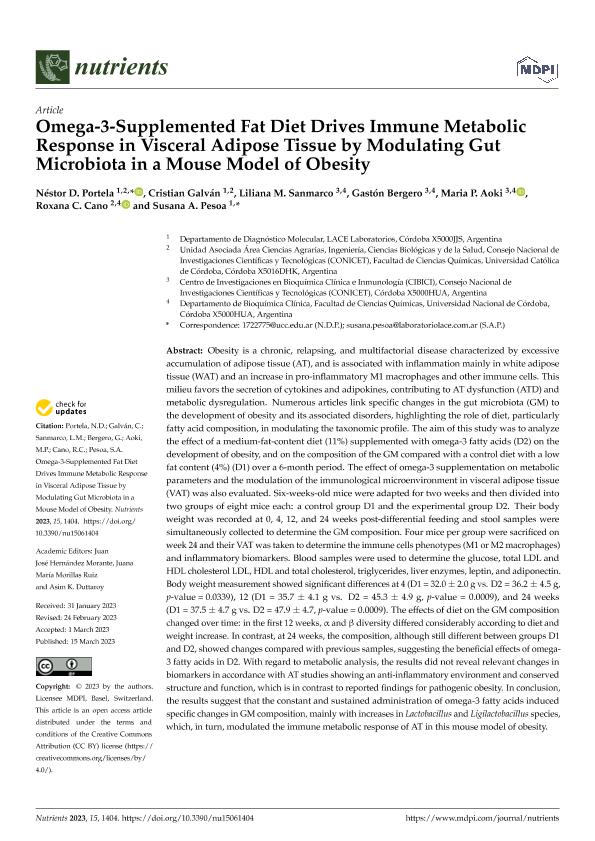Mostrar el registro sencillo del ítem
dc.contributor.author
Portela, Néstor Denis

dc.contributor.author
Galván, Cristian
dc.contributor.author
Sanmarco, Liliana Maria

dc.contributor.author
Bergero, Gastón

dc.contributor.author
Aoki, Maria del Pilar

dc.contributor.author
Cano, Roxana Carolina

dc.contributor.author
Pesoa, Susana A.
dc.date.available
2024-02-08T10:50:32Z
dc.date.issued
2023-03
dc.identifier.citation
Portela, Néstor Denis; Galván, Cristian; Sanmarco, Liliana Maria; Bergero, Gastón; Aoki, Maria del Pilar; et al.; Omega-3-Supplemented Fat Diet Drives Immune Metabolic Response in Visceral Adipose Tissue by Modulating Gut Microbiota in a Mouse Model of Obesity; Multidisciplinary Digital Publishing Institute; Nutrients; 15; 6; 3-2023; 1-27
dc.identifier.uri
http://hdl.handle.net/11336/226261
dc.description.abstract
Obesity is a chronic, relapsing, and multifactorial disease characterized by excessive accumulation of adipose tissue (AT), and is associated with inflammation mainly in white adipose tissue (WAT) and an increase in pro-inflammatory M1 macrophages and other immune cells. This milieu favors the secretion of cytokines and adipokines, contributing to AT dysfunction (ATD) and metabolic dysregulation. Numerous articles link specific changes in the gut microbiota (GM) to the development of obesity and its associated disorders, highlighting the role of diet, particularly fatty acid composition, in modulating the taxonomic profile. The aim of this study was to analyze the effect of a medium-fat-content diet (11%) supplemented with omega-3 fatty acids (D2) on the development of obesity, and on the composition of the GM compared with a control diet with a low fat content (4%) (D1) over a 6-month period. The effect of omega-3 supplementation on metabolic parameters and the modulation of the immunological microenvironment in visceral adipose tissue (VAT) was also evaluated. Six-weeks-old mice were adapted for two weeks and then divided into two groups of eight mice each: a control group D1 and the experimental group D2. Their body weight was recorded at 0, 4, 12, and 24 weeks post-differential feeding and stool samples were simultaneously collected to determine the GM composition. Four mice per group were sacrificed on week 24 and their VAT was taken to determine the immune cells phenotypes (M1 or M2 macrophages) and inflammatory biomarkers. Blood samples were used to determine the glucose, total LDL and HDL cholesterol LDL, HDL and total cholesterol, triglycerides, liver enzymes, leptin, and adiponectin. Body weight measurement showed significant differences at 4 (D1 = 32.0 ± 2.0 g vs. D2 = 36.2 ± 4.5 g, p-value = 0.0339), 12 (D1 = 35.7 ± 4.1 g vs. D2 = 45.3 ± 4.9 g, p-value = 0.0009), and 24 weeks (D1 = 37.5 ± 4.7 g vs. D2 = 47.9 ± 4.7, p-value = 0.0009). The effects of diet on the GM composition changed over time: in the first 12 weeks, α and β diversity differed considerably according to diet and weight increase. In contrast, at 24 weeks, the composition, although still different between groups D1 and D2, showed changes compared with previous samples, suggesting the beneficial effects of omega-3 fatty acids in D2. With regard to metabolic analysis, the results did not reveal relevant changes in biomarkers in accordance with AT studies showing an anti-inflammatory environment and conserved structure and function, which is in contrast to reported findings for pathogenic obesity. In conclusion, the results suggest that the constant and sustained administration of omega-3 fatty acids induced specific changes in GM composition, mainly with increases in Lactobacillus and Ligilactobacillus species, which, in turn, modulated the immune metabolic response of AT in this mouse model of obesity.
dc.format
application/pdf
dc.language.iso
eng
dc.publisher
Multidisciplinary Digital Publishing Institute
dc.rights
info:eu-repo/semantics/openAccess
dc.rights.uri
https://creativecommons.org/licenses/by/2.5/ar/
dc.subject
ADIPOSE TISSUE MACROPHAGES
dc.subject
GUT MICROBIOTA
dc.subject
HIGH FAT DIET
dc.subject
IMMUNE-METABOLISM
dc.subject
OBESITY
dc.subject
OMEGA-3
dc.subject
VISCERAL ADIPOSE TISSUE
dc.subject.classification
Otras Ciencias de la Salud

dc.subject.classification
Ciencias de la Salud

dc.subject.classification
CIENCIAS MÉDICAS Y DE LA SALUD

dc.title
Omega-3-Supplemented Fat Diet Drives Immune Metabolic Response in Visceral Adipose Tissue by Modulating Gut Microbiota in a Mouse Model of Obesity
dc.type
info:eu-repo/semantics/article
dc.type
info:ar-repo/semantics/artículo
dc.type
info:eu-repo/semantics/publishedVersion
dc.date.updated
2024-02-06T12:59:02Z
dc.identifier.eissn
2072-6643
dc.journal.volume
15
dc.journal.number
6
dc.journal.pagination
1-27
dc.journal.pais
Suiza

dc.journal.ciudad
Basilea
dc.description.fil
Fil: Portela, Néstor Denis. Lace Laboratorios; Argentina. Universidad Católica de Córdoba. Facultad de Ciencias Químicas; Argentina
dc.description.fil
Fil: Galván, Cristian. Lace Laboratorios; Argentina. Universidad Católica de Córdoba. Facultad de Ciencias Químicas; Argentina
dc.description.fil
Fil: Sanmarco, Liliana Maria. Consejo Nacional de Investigaciones Científicas y Técnicas. Centro Científico Tecnológico Córdoba. Centro de Investigaciones en Bioquímica Clínica e Inmunología; Argentina. Universidad Nacional de Córdoba. Facultad de Ciencias Químicas. Departamento de Bioquímica Clínica; Argentina
dc.description.fil
Fil: Bergero, Gastón. Consejo Nacional de Investigaciones Científicas y Técnicas. Centro Científico Tecnológico Córdoba. Centro de Investigaciones en Bioquímica Clínica e Inmunología; Argentina. Universidad Nacional de Córdoba. Facultad de Ciencias Químicas. Departamento de Bioquímica Clínica; Argentina
dc.description.fil
Fil: Aoki, Maria del Pilar. Consejo Nacional de Investigaciones Científicas y Técnicas. Centro Científico Tecnológico Córdoba. Centro de Investigaciones en Bioquímica Clínica e Inmunología; Argentina. Universidad Nacional de Córdoba. Facultad de Ciencias Químicas. Departamento de Bioquímica Clínica; Argentina
dc.description.fil
Fil: Cano, Roxana Carolina. Universidad Nacional de Córdoba. Facultad de Ciencias Químicas. Departamento de Bioquímica Clínica; Argentina
dc.description.fil
Fil: Pesoa, Susana A.. Lace Laboratorios; Argentina
dc.journal.title
Nutrients
dc.relation.alternativeid
info:eu-repo/semantics/altIdentifier/doi/http://dx.doi.org/10.3390/nu15061404
dc.relation.alternativeid
info:eu-repo/semantics/altIdentifier/url/https://www.mdpi.com/2072-6643/15/6/1404
Archivos asociados
